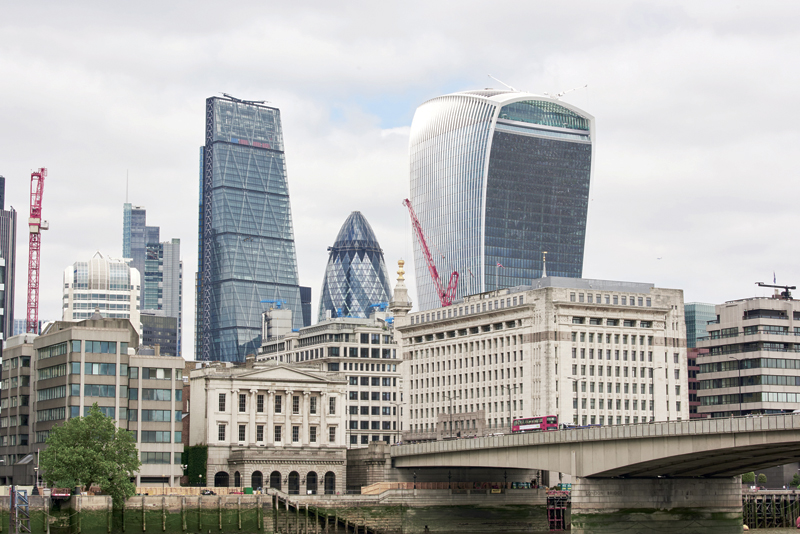

Esha Vaish and Dasha Afanasieva -
Chinese investment in London commercial property has more than trebled since before Britain voted to leave the European Union, most of it channelled through Hong Kong at a time of heightened political uncertainty in the former British colony. While others have pulled back from British property following last year’s Brexit referendum, investors largely from Hong Kong are snapping up the British capital’s best-known skyscrapers including the “Cheesegrater” and “Walkie Talkie”.

In the first six months of 2017 Chinese investors spent £3.96 billion ($5.10 billion) on London commercial property according to data from the CBRE real estate group, the highest amount on record and outpacing the £2.69 billion spent in the whole of 2016.
Hong Kong accounted for 92 per cent of the Chinese investment, according to the Knight Frank agency.
Hong Kong food conglomerate Lee Kum Kee is set to pay £1.28 billion later this month for 20 Fenchurch Street — the 34 storey skyscraper known as the Walkie Talkie — a record for an office building in Britain.
With Beijing cracking down on foreign deals by mainland companies, investors there are instead using Hong Kong as a conduit for overseas deals.
China’s state planner announced on Friday that the country will strengthen rules to defuse risks for domestic companies investing abroad and curb “irrational” overseas investment.
However, Hong Kong-based investors are more significant players.
“Deals from mainland China already make up a smaller proportion of the activity from the region, with Hong Kong investors most active,” said Anthony Duggan, head of capital markets research at Knight Frank. “We expect that Chinese investors will still look to make strategic real estate purchases that fit within their business plans.”
Hong Kong’s freedoms, including judicial independence, are constitutionally enshrined under a “one country, two systems” deal struck before Britain returned the territory to China in 1997.
However, concerns have been rising in recent years and an appeals court jailed three leaders of Hong Kong’s democracy movement last week.
Tens of thousands protested in Hong Kong on Sunday against the jailing of the young activists, with many demonstrators questioning the independence of the judiciary.
Hong Kong’s legal chief has denied any “political motive” in seeking the prison terms.
TAKING CONTROL
“If you’re concerned that China is taking control of Hong Kong more and more and you need to take capital out of that jurisdiction, London is attractive,” said Chris Brett, head of international capital markets at CBRE.
Several factors are drawing the investment, including sterling’s 12 per cent drop since the Brexit referendum against the US dollar — to which the Hong Kong dollar is pegged.
“Cheaper money, the rule of law, cultural familiarity and a need to diversify out of a home market is what’s driving Hong Kong demand in the UK,” said James Beckham, head of central London investment at property consultant Cushman & Wakefield, which advised the Walkie Talkie’s buyers and Cheesegrater’s sellers.
Record Hong Kong commercial and residential property prices, along with the political concerns are pushing investors to turn to overseas markets where rental yields are higher.
The illiquidity of a building compared with other investments is also an attraction, should Beijing demand that funds be repatriated to China, Jefferies analyst Mike Prew said.
The Brexit vote means some London-based financial jobs will shift to the continent or Ireland so that banks can continue selling to clients in the EU.
But this negative factor for the office market is offset by the pound’s fall, which makes property cheaper for foreign investors, and the fact that the buildings sold have come with tenants signed up to leases of around 10-15 years.
Real estate sources said other City of London landmarks, including 30 St Mary Axe — known as the Gherkin — and the Heron Tower are also attracting interest from Hong Kong investors.
These prime “trophy” assets, like the Cheesegrater and Walkie Talkie, have well-known tenants and are in limited supply.
Chinese pricing of UK commercial real estate has already established an “entry premium” of about 100 basis points on yields for platinum or top grade buildings, according to Prew.
Capital from China and Hong Kong has accounted for a third of all investment in London commercial real estate this year, up from less than 10 per cent before the referendum, according to CBRE.
This stands in contrast to other investors.
Money raised by UK property-focused private equity funds has fallen since the Brexit vote, with $2.9 billion raised in the first half of 2017 compared with $3.7 billion a year earlier, according to data from Prequin.
That’s as the outlook for the London office market as a whole clouds before Britain’s EU exit in 2019.
The amount of empty space has jumped since the referendum, with developers having to offer longer rent-free periods and lease breaks early into leases to secure tenants.
Central London office developer Derwent London, which has a portfolio worth £4.8 billion, forecast that 2017 rental values would be anything between down 3 per cent to up 2 per cent. — Reuters
Oman Observer is now on the WhatsApp channel. Click here



